Floods are synonymous with Bangladesh. The country is essentially a huge river delta, as three of the world’s biggest rivers -- the Padma (known as the Ganges in India), the Meghna, and the Brahmaputra -- end their journey from the Himalayas in Bangladesh. Every year, the June-to-September monsoon season brings a relief from the heat as well as 75% of the annual rainfall to Bangladesh. All of that extra water means flooding, especially in Dhaka, where overcrowding and poor sanitation have made it impossible for the water to flow out quickly. The floods in 2004 temporarily displaced more than 20 million people.
However, the flooding also enables Bangladesh to feed its 145 million people. Farmers have relied on the annual floods for centuries for planting their crops of rice, the staple food of Bangladesh. With the floods comes nutrient-rich soil; in a normal year about 30% of the land floods, becoming ideal for replanting rice seedlings. Despite a regular “hungry season” in January, Bangladesh usually just manages to produce enough rice to keep people here alive, thanks to the annual floods.
Well, it looks like that might be changing. Last year’s monsoon was remarkably dry for June, July and August. It wasn’t until September that enough rain came to enable the farmers to replant the rice crops -- but yields were much lower than those in a normal year. This year’s situation is even worse. The three big rivers are at their lowest monsoon season level in 14 years. Imams across the country are instructing their congregations to pray for rain. Meanwhile, the weather forecasters here are not expecting any major rains during the rest of the monsoon season.
That means no flooding -- and for Bangladesh, that’s as bad as too much.
Sunday, August 27, 2006
Saturday, August 26, 2006
A Quick Trip to Nepal
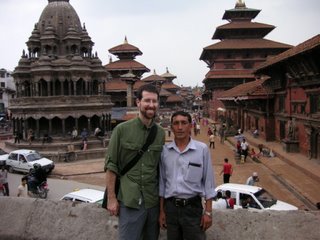
Back in June I took a week's trip to Nepal with my boss, Joe. (That's not him in the picture with me.) He usually covers the work in Nepal, but he was going to be in the States on vacation for five weeks over the summer. So, I needed to get caught up on everything that he was working on.
 Only one airline flies directly from Dhaka to Kathmandu -- Biman Bangladesh. The national airline of Bangladesh, Biman enjoys neither a stellar safety record nor a stalwart reputation for punctuality or customer service. After only a five-hour delay (for a one-hour flight), we made it safely to Kathmandu.
Only one airline flies directly from Dhaka to Kathmandu -- Biman Bangladesh. The national airline of Bangladesh, Biman enjoys neither a stellar safety record nor a stalwart reputation for punctuality or customer service. After only a five-hour delay (for a one-hour flight), we made it safely to Kathmandu.Thanks to Biman's erratic schedule, Joe and I had to fly a day early to Nepal -- meaning we had a day to see some sights before we started a week of long days (and nights) in the office. It was a quick day trip around the temples, but enough to get me excited for another trip soon....
- Patrick.
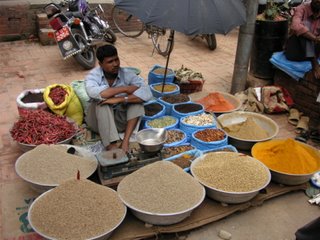
Can you get to Moscow from here?
So, Moscow was not exactly a city I thought I would visit while living in South Asia. But would you pass up an opportunity to see the Kremlin and Red Square, especially on the company’s tab? I think not. The IFC/World Bank is quite big on “learning opportunities” and takes training its people quite seriously. All new IFC staff are invited to attend the “IFC Induction” course, a week-long welcome-to-the-club covering A-Z of what’s what and who’s who. It is held about 4 times a year in different locations. This one, held in mid-July, was the first one ever to be held in Moscow. My fellow inductees and I found out why.
The hotel we were set up in was called the Ismailovo and turned out to be an old Soviet-style 3-star, *way* out of the city and not at all set up for international guests. If you didn’t speak Russian, you were at loss to make the hotel staff understand anything you might need. The facilities were quite basic – no air conditioning and a conveniently placed thermometer in your room to tell you it was 28 Celsius in the middle of the night. You had to put down a deposit in cash to make a phone call. And the food was awful. It was not the Moscow office staff to blame at all, however, so that must be said. They had a budget to work within and Moscow was recently named the most expensive city in the world.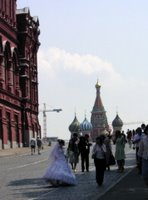 However, the situation was bad enough to warrant a budget-busting move to the beautiful old Metropolitan Hotel just minutes away from the Kremlin and Red Square by Day Two. Quite an exciting start to my first visit to Russia.
However, the situation was bad enough to warrant a budget-busting move to the beautiful old Metropolitan Hotel just minutes away from the Kremlin and Red Square by Day Two. Quite an exciting start to my first visit to Russia.
To get to Moscow from Dhaka, you fly through Dubai (United Arab Emirates) and have to stay overnight. Luckily, our friends “the other Wilsons” were also along as Craig, my colleague, was also attending the course. We had a chance to see some of Dubai on the layover afternoon and evening. Weird city. Built up out in the middle of the desert and populated by very few natives, it offers the wildest things to visitors and residents, many of whom are ultra-rich.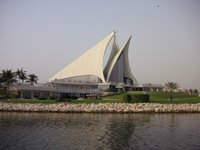
You can go to a huge shopping mall and ski – yes, ski – in the middle of the desert. I’m all about out of the ordinary experiences, but I just don’t need to ski inside a shopping mall in the desert. Anyway, there was good food and interesting street shopping – okay for killing a few hours, but I would not want to really vacation there, and certainly not live there. Too artificial.
The highlight of visiting Moscow (well, besides taking a quick jog through Red Square one morning, which is actually must smaller than I imagined) was seeing our friends from Washington, Sean and Laurie – and their daughter, Isabella, who was but a wee thing when they left DC. Managed to get a nice picture with Sean to prove I was there! They actually left Moscow to head back to DC the day after I saw them, awaiting the birth of number two.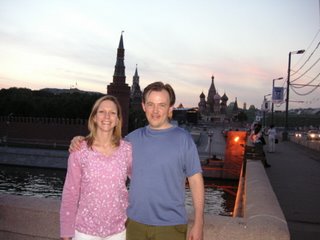
-- Jennifer
The hotel we were set up in was called the Ismailovo and turned out to be an old Soviet-style 3-star, *way* out of the city and not at all set up for international guests. If you didn’t speak Russian, you were at loss to make the hotel staff understand anything you might need. The facilities were quite basic – no air conditioning and a conveniently placed thermometer in your room to tell you it was 28 Celsius in the middle of the night. You had to put down a deposit in cash to make a phone call. And the food was awful. It was not the Moscow office staff to blame at all, however, so that must be said. They had a budget to work within and Moscow was recently named the most expensive city in the world.
 However, the situation was bad enough to warrant a budget-busting move to the beautiful old Metropolitan Hotel just minutes away from the Kremlin and Red Square by Day Two. Quite an exciting start to my first visit to Russia.
However, the situation was bad enough to warrant a budget-busting move to the beautiful old Metropolitan Hotel just minutes away from the Kremlin and Red Square by Day Two. Quite an exciting start to my first visit to Russia.To get to Moscow from Dhaka, you fly through Dubai (United Arab Emirates) and have to stay overnight. Luckily, our friends “the other Wilsons” were also along as Craig, my colleague, was also attending the course. We had a chance to see some of Dubai on the layover afternoon and evening. Weird city. Built up out in the middle of the desert and populated by very few natives, it offers the wildest things to visitors and residents, many of whom are ultra-rich.

You can go to a huge shopping mall and ski – yes, ski – in the middle of the desert. I’m all about out of the ordinary experiences, but I just don’t need to ski inside a shopping mall in the desert. Anyway, there was good food and interesting street shopping – okay for killing a few hours, but I would not want to really vacation there, and certainly not live there. Too artificial.
The highlight of visiting Moscow (well, besides taking a quick jog through Red Square one morning, which is actually must smaller than I imagined) was seeing our friends from Washington, Sean and Laurie – and their daughter, Isabella, who was but a wee thing when they left DC. Managed to get a nice picture with Sean to prove I was there! They actually left Moscow to head back to DC the day after I saw them, awaiting the birth of number two.

-- Jennifer
Saturday, August 05, 2006
Bhago's First Birthday

As most of you know, we adopted a Dhaka street do— er, rather, a "Bengali Pacer," back in October. He’s 40 pounds of black-and-white fury, terrorizing any jogger, gecko, plush chew toy or inert piece of furniture that crosses his path. Bhagoban (Bangla for "lucky") is one year old this month. So raise a cup of kibble for the wee beastie of Daffodil House!




Wednesday, August 02, 2006
Nerdy Diplomats Who Rock (Are Still Nerdy)
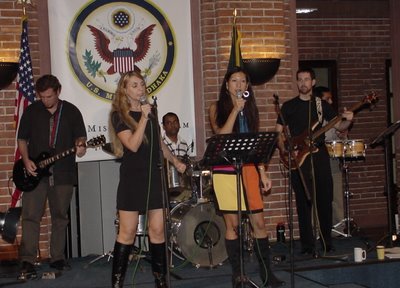
Twice a year the Embassy holds an Awards Ceremony to honor employees who have demonstrated extraordinary performance in their duties during the course of the previous six months. After the most recent ceremony in June, another extraordinary performance took place – namely, a concert by a band of Embassy employees. We did an organized set of seven songs, in both English and Bangla, then jammed for a while on a bunch of other tunes for another hour or so. And the name of this all-star group? Well, we struggled to come up with a good handle. The consensus favorite of the audience was “Flood, Sweat & Tears,” which, in the words of our lead guitarist, “pretty much sums up the whole Bangladesh experience.”
- Patrick.
Among the Headhunters with the Tiger-Slaying Priest

At the end of May, we had another opportunity for a unique experience in Bangladesh. How many people have met a gun-toting, motorcycle-riding, 78-year-old, Michigan-born Catholic Priest who has lived in the jungles of Bangladesh among tribal peoples (who were headhunters, literally, in the not-so-distant past) for 50 years? Yes, he exists and his name is Rev. Eugene E. Homrich, C.S.C. supported by the Holy Cross Mission Center in Notre Dame and running St. Paul’s mission in Pirgacha, Bangladesh. Our good friend, Paul, had heard tales of the legendary “tiger-slaying” priest and was eager to arrange a visit for a small group of us. We had a fabulous time hearing his stories, including the one about finding an abandoned baby in the forest many years ago. Father Homrich and his mission took her in and now she is a happy mother of her own. We also enjoyed exploring the quiet countryside of this beautiful area, where pineapples and jackfruit grow and monkeys play. Not much of that in Dhaka!
One of our long walks through the forest got us talking about the likelihood of us “development workers” finding abandoned babies in our path while we’re sitting at our computers, in our air-conditioned offices, typing e-mails to colleagues and bosses and writing reports about the state of development in Bangladesh. We sometimes struggle to reconcile this to ourselves. Yes, we live in (arguably) the poorest country on the planet and we think we’re here for good causes, but does what we do every day really impact the ultra-poor here? We shoo away dozens of beggars daily on our way to the office – where we work on projects that we hope will benefit millions ... but would we be better off taking those beggars home with us? Well, this is a question for much longer debate, but may it suffice to say that our time with Father Homrich left us reflective, inspired and downright awed by the man and his work.


Subscribe to:
Comments (Atom)
